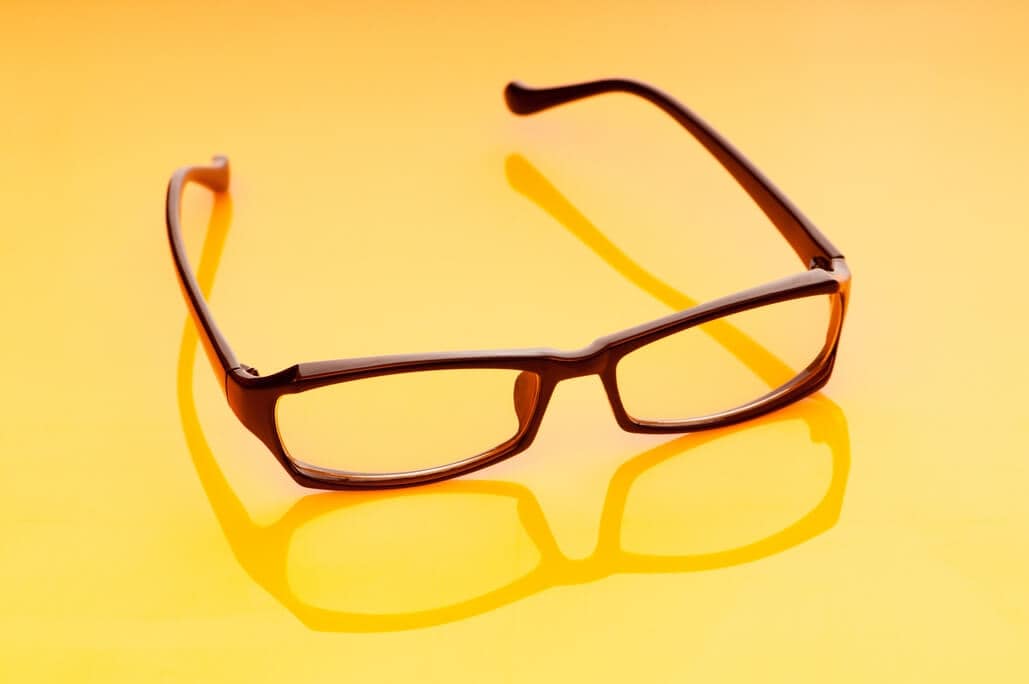There are many materials, designs, coatings, and treatment options to consider when you are choosing lenses to go in your newest pair of glasses. These seemingly simple decisions can have a huge impact on your satisfaction with your lenses. At Eye Theory, our experienced opticians can help you navigate the overwhelming task of choosing new lenses. We have also compiled a quick reference guide to help answer some frequently asked questions about lenses.
What Lens Material Should I Choose for Glasses?
The material used to make your lenses can impact the optics and clarity of your vision. One of the most commonly used materials is CR-39, a lightweight and cost-effective plastic material that delivers good optics and clear vision. While CR-39 is a strong lens, it does not include any additional coatings or special properties. Another popular lens choice is polycarbonate lenses. Polycarbonate is a durable, shatter-resistant material. Its protective properties make it ideal for children, and it also provides some UV protection. For people with strong prescriptions who want to avoid thick lenses, a high index material should be considered. High index lenses help reduce the thickness and weight of lenses, which makes them more comfortable and cosmetically appealing.
What Lens Coatings Should I Consider?
After you decide on a lens material, you need to decide on any additional lens coatings or treatments that you need to make your lenses suit your needs. The most popular option is an anti-reflective coating. This special treatment reduces reflections from both the front and back surface of your lenses and helps to reduce glare and improve visual comfort. If you are bothered by glare from overhead lights, oncoming headlights, or long hours at the computer, this coating should be considered. It also helps improve the cosmetic appearance of lenses and makes your lenses less noticeable. You may consider treatments such as scratch-resistant coatings or UV-blocking coatings, though many lens materials, such as polycarbonate lenses, already include these properties. Another popular lens option is photochromatic treatment. Photochromatic lenses are clear lenses that transition into tinted sunglass lenses when exposed to UV light. Photochromatic lenses are a cost-effective way to avoid buying both regular glasses and prescription sunglasses. Though they are great for efficiency, photochromatic lenses have some drawbacks. In certain conditions, they can be slow to change back into a clear lens after coming inside on a sunny day, leaving you with tinted lenses for longer than desired. Additionally, because car windows and windshields are designed to block UV rays, most photochromatic lenses will not work in a car. If you are more interested in a pair of prescription sunglasses for your outdoor needs, you can choose to have polarized lenses. This treatment is used in sunglasses to filter out horizontal reflecting rays. This can significantly reduce glare and improve clarity, and many outdoorsmen favor this lens coating.
A highly trained optician is invaluable when it comes to choosing lenses. By learning about how you use your eyes, including your job, your hobbies, and your type of prescription, they can help make tailored recommendations so you are satisfied with your glasses.
Our eye doctors at Eye Theory in Houston, TX excel in the prescription of contact lenses, glasses and various eye diseases. Call our optometrist at 832.831.7386 or schedule an appointment online if you would like to learn more about lens. Our eye doctor, Dr. Jonathan Tsao, provides the highest quality optometry services and eye exams in the Midtown and Southside Commons (Southside Place) vicinities of Houston, Texas.





